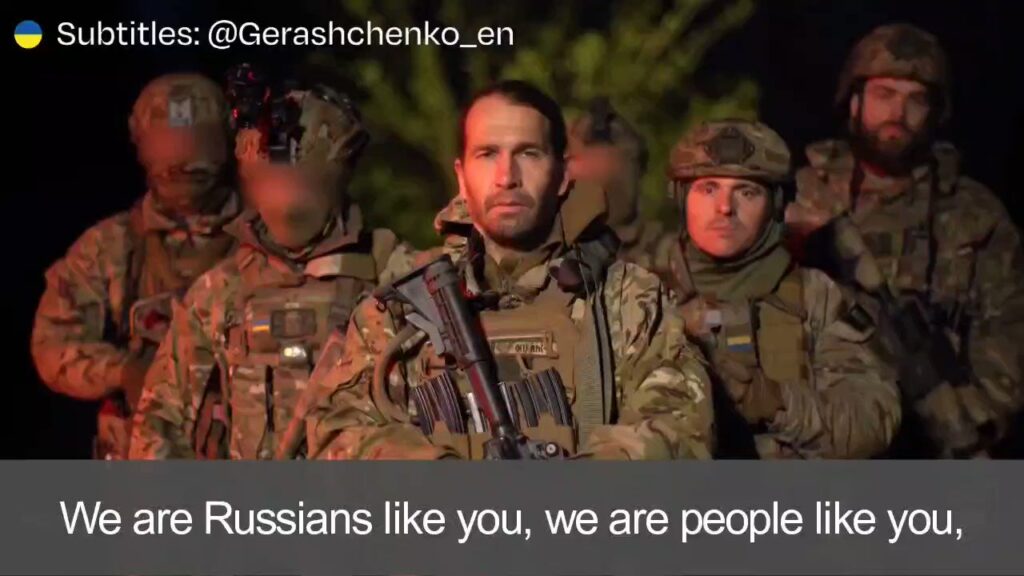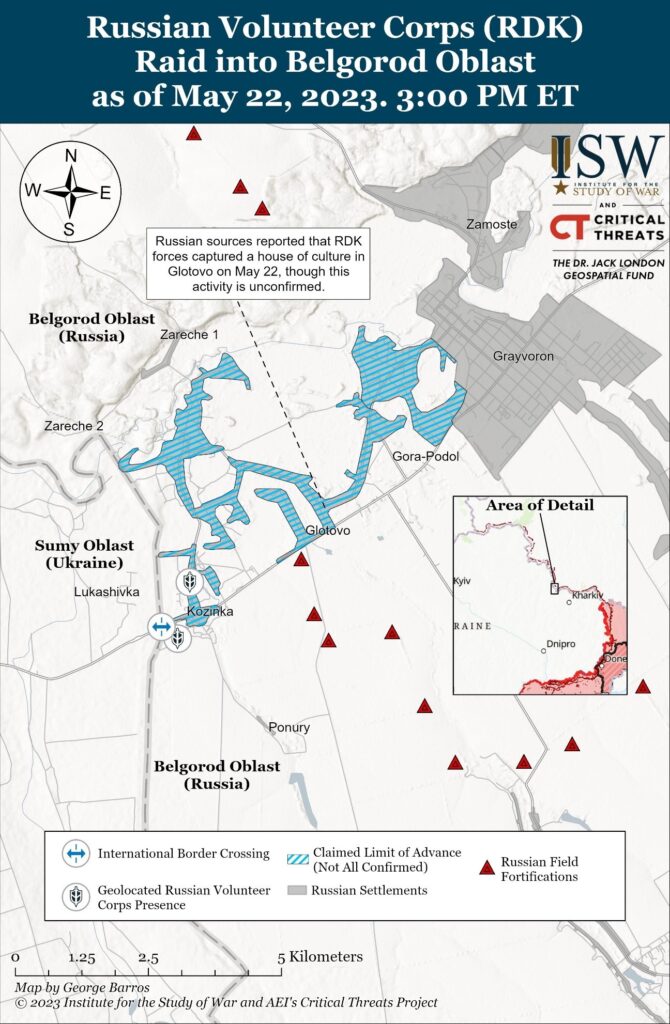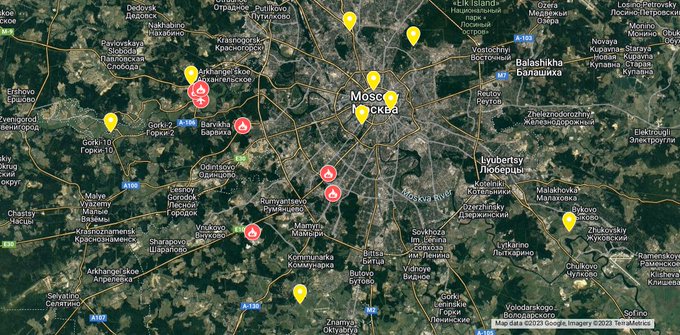Both the ground raids and the drone air strikes are not only going to accelerate the collapse of Russia’s military positions in Ukraine but also Putin’s standing at home
(Russian/Русский перевод; Если вы состоите в российской армии и хотите сдаться Украине, звоните по этим номерам: +38 066 580 34 98 или +38 093 119 29 84; инструкции по сдаче здесь)
By Brian E. Frydenborg (Twitter @bfry1981, LinkedIn, Facebook) May 31, 2023; see related June 28 follow up after Prigozhin’s Wagner revolt Putin’s (and Russia’s) Naked Weakness; also see related June 13 article The Coming Siege of Crimea?; because of YOU, Real Context News surpassed one million content views on January 1, 2023, but I still need your help, please keep sharing my work and consider also donating! Real Context News produces commissioned content for clients upon request at its discretion.

SILVER SPRING—“As Russia fought a war that was unpopular, disastrous, and self-destructive—all increasingly so—to the point of unraveling its social contract between ruler and ruled, Russians began to desert the military and revolt, even fighting against the Russian government to overthrow it and raiding and taking territory from the jurisdiction of Russian authorities. It was not long before Russia’s ruling elites were deposed and replaced by new blood.”
That could be a near-future account of the end of the Putin regime (the positive effects of which I have mused on before), but incredibly that would also be a fitting description of the Russian Empire in 1917, a time I am thinking a lot about while reading Antony Beevor’s excellent account of the period in Russia: Revolution and Civil War, 1917-1921, but sadly, I am speaking of Russia now in 2023.
Well over a year into Russia’s massive escalation of this war, Russia finds its own capital under attack and its border regions threatened by Ukraine and Russian rebels, clearly things Putin did not anticipate. The longer this war goes on, the worse it is for Russia, and if Putin cannot defend Russia itself, how can he defend Russian-occupied territory in Ukraine? The answer is that, over time, he cannot, and that will be his undoing.
Setting the Stage for the Meaning of Russia’s Latest Shocking Setbacks
For many months, it has been clear that Russia’s failure of an army is incapable of mounting competent offensives (see its ten-month Pyrrhic Bakhmut campaign as a prime example). Rather, for the most part, Ukraine has been setting the tones, times, and places of fighting (e.g., it was Ukraine’s deliberate strategy to maintain resistance in Bakhmut in the face of a massive Russian onslaught so as to bog down Russian forces there and allow it to keep wasting lives, equipment, and supplies trying to take Ukraine’s fifty-eighth largest city by a 2021 official estimate while neglecting, basically, everywhere else). Ukraine chose to take a more patient and prudent approach to preserve far more of its own men overall while allowing the Russians’ stupidity and limitations to destroy themselves as Ukraine itself used its advanced, precise Western weapons and munitions and its clever ingenuity to strike hard at Russian targets of opportunity, all while allowing the harsh months of “General Winter” to further whittle down Russian forces equipped, led, and supplied far more poorly than Ukraine’s.
While exhausting itself in the east, and losing a huge net amount of territory over an entire yearlong period, Russia had already shown it was vulnerable on its own soil to Ukrainian drone strikes against bases deep inside Russia months earlier. And there was that very minor drone strike from early May against a Kremlin dome in Moscow that is still murky as to its origins and perpetrators. But the most recent attacks—with 1.) Russian rebel ground forces penetrating into Russia and holding Russian territory for days before withdrawing and with 2.) airborne drones hitting the city of Moscow itself—mean that Russia’s position is even more helpless and pathetic than it was before.
Five weeks ago, when Ukraine finally successfully crossed and established a presence across the Dnipro River from Kherson city, it was a momentous moment which, as I noted at the time, meant that the whole of the south of Ukraine that was occupied by Russia was now vulnerable to being retaken by the Armed Forces of Ukraine. Back in April 2022 I noted that Crimea would eventually be quite vulnerable (a “perfect understanding” according to Mykhailo Podolyak, a top advisor to Ukrainian President Volodymyr Zelensky) and built upon that understanding in August and again in October to note that, after Ukraine would retake Kherson city (which happened over a month later) and the eventual crossing of the Dnipro River there (which, as noted, happened late last month), the rest of the south would be open to Ukraine. As part of that analysis, I noted, too, that this would essentially be the beginning of the end of the war—not in terms of a quick resolution but in terms of setting the stage for shaping the final main campaigns of the war. As I have argued, it comes down to a mathematical equation and Russia is going to lose out badly no matter how it tries to arrange its numbers and factors on its side of the equation, which cannot handle what Ukraine with the help of its allies is going to throw at it. In other words, more major collapses of Russian positions are inevitable. As I noted in July, the defeat of Russia may very well take time, but it is coming.
Part of the reason is that Russia’s shambolic eastern campaign in particular has left it spread perilously thin throughout Ukraine and suffering from severe and chronic manpower, equipment, and ammunition shortages (perhaps most famously broadcast in the screaming tirades directed at Kremlin higher-ups from Wagner mercenary group warlord Yevgeniy Prigozhin), with those issues already huge problems for Russia even long before it began this battle for Bakhmut at the beginning of August. As has been well documented, for many months, Russia has been throwing untrained conscripts into battle in Ukraine with decades-old, obsolete equipment (even just before Russia’s February 24, 2022 escalatory invasion, Russian soldiers who would lead that invasion were being given expired rations!). And the key point is this: when Ukraine crossed the Dnipro River in late April and was finally in a position to seriously threaten the south and even Crimea, this meant that Russia’s already poorly supplied and overstretched military forces had to now consider adjusting in major ways its deployment of forces, which in the position it is in now is a lot like playing a game of Jenga but with thousands of soldiers’ lives instead of blocks.
Now, keep in mind that this was clearly the situation a month ago with Ukraine’s crossing of the Dnipro and establishing a presence on its south/east bank, before the recent ground raids into Russia and yesterday’s Moscow drone attacks. Also keep in mind that not long after that Dnipro crossing, Russia had just started trying to grapple with new British-supplied Storm Shadow missiles with twice the range of the already devastating HIMARS ammunition, meaning their contingency plans for dealing with HIMARS strikes as far as they had and implemented them at all became somewhat obsolete, the Storm Shadows being used to devastating effect.
Why the Borderland Ground Raids and Moscow Strikes Are Amplifying Problems for Russia
But with those twin developments of the ground raids of last week and yesterday’s drone strikes, the effects along the nature of what I italicized above are only going to be significantly worse and will lead to even more catastrophic losses for a Russia that cannot handle much more severe misfortune for its war and regime to continue. Before, Russia had to worry about cannibalizing already weak positions to meet threats to its occupied territory in Ukraine’s south, one of Russia’s most undermanned sectors in Ukraine. But now, Russia has to worry about shoring up ground defenses throughout the regions on much of its border with Ukraine and has to worry about air defenses all the way to Moscow. In short, these developments make already critical and debilitating problems for Russia far worse, adding more pressure on the already weak infrastructure of its entire war effort.
And that is a total disaster for Russia.
In its hubris, Russia likely thought Ukraine would not dare think of attacking Russia itself, let alone be capable of such. But significant parts of Russia’s border regions with Ukraine are remote from major cities and do not have major highways near them, making it hard for Russia to reinforce and repel even small unanticipated attacks across such a large area. It is entirely possible for Ukraine or the Russian rebels Ukraine is supporting to actually take Russian territory from Russian government control and hold it for some time, forcing Russia to panic and divert large amounts of troops and equipment to retake its territory and perhaps giving Ukraine more leverage with which to bargain after it pushes Russia out of all its territory and meaningful negotiations can begin (if it comes to that).
Russia also needs as many air defenses near the front as possible, as Ukraine has been adept with its precise artillery, munitions, reconnaissance, and intelligence at destroying enough Russian air defenses to actually give Ukraine air superiority during some key moments when coupled with its own advanced Western air defenses that severely limit Russia’s ability to use its own air force, even fifth-generation aircraft like the Su-57. With yesterday’s mysterious drone attacks on Moscow, Russia and its people are flat-out freaking out and the Kremlin will be forced to place substantial air-defense resources throughout the hundreds of miles between Moscow and the Ukrainian border.
At an absolutely critical moment in the war shortly before a big Ukrainian counteroffensive that will see even newer advanced Western weapons come to bear against their outmatched Russian counterparts and that was already going to be a disaster for Russia even without those new weapons systems in the hands of Ukraine, needing to divert troops and air defenses to cover large sections of European Russia is just about the last realistic development that Russia can handle.
So when two groups of Russian rebels fighting inside Ukraine against Russia government forces—the Russian Volunteer Corps (R.D.K.) and the Free Russia Legion (also translated as the Freedom of Russia Legion or Liberty of Russia Legion)—conducted ground raids last week into the two Russian oblasts (provinces) of Belgorod and Kursk (the former lasting several days), the aforementioned results are precisely what happened: mass panic and a mad rush by Russia to throw whatever it could into the areas to appear to be fulfilling its responsibility of defending its own territory, including taking troops from front lines in Ukraine where they were badly needed. Earlier tiny raids by R.D.K. in March and April of this year were rather insignificant, but the newer raids signify what is essentially a new front for Russia to defend inside Russia at a time when it will barely be able to defend what it is desperately hoping to hold onto in Ukraine.
Likewise, the drone attacks yesterday in the Moscow region—which Ukraine is coyly denying—are another area where Russia did not imagine it would have to play defense well over a year into what Putin assumed would be a very short and easy operation.
And if Putin does not weaken fronts in Ukraine to boost Russia’s border regions’ defense or divert more air defense systems to protect the hundreds of miles of Russian territory from Moscow south to the border with Ukraine, then Putin faces an even more fraught domestic situation and will be blamed for not doing more to protect Russians in Russia. And keep in mind this is lose-lose: this is not a situation where Russia’s prospects look good in one area by denying resources going somewhere else, but a choice of degree and speed of losing in one place versus another.
Either way, when the raids and drone strikes come so soon one after the other, the psychological blows are pretty bad for Russians, including the Muscovites Putin has sought to shelter from the effects of the war in order to stave off unrest and threats to his rule in the capital, with Putin himself barely mentioning the war publicly. But after these drone strikes in Moscow, it is hard to see how anyone can think that the war is going well for Russia now, and criticism of Russia’s leadership and the conduct of the war will only grow. And this will only accelerate even more than the coming counteroffensive was already going to accelerate the process of Russians collectively turning on Putin and deciding he is a loser who needs to go so Russia can ends its pointless losing war effort that brings Russia nothing but loss and suffering.
The frustration and rage will not only be with Russian citizens and the bureaucrats of the Kremlin, but the military itself. With the Russian military about to suffer one or more major defeats from Ukraine’s looming counteroffensive, there is a real possibility for morale in Russian formations to collapse yet again, causing whole fronts to collapse yet again, as Russian soldiers see Putin being unable to protect Russians near the border and even Moscow itself from attack. Russians that surrender or desert may increasingly defect and be willing to fight against the Russian military (whole units turning on the Russian government of first the tsar and then later factions, from the Bolsheviks to the Whites, became a common feature in 1917 and years following once things went past certain points of awfulness, as Beevor’s book catalogues). One thing that is certain is that with each major setback for Russia, morale gets lower and lower and there is a floor for that, as in all wars, beyond which soldiers will no longer fight: any group of men in any army have their breaking point, and Russia’s army is obviously nowhere even close to being one of the best or most resilient.
Yes, things were bad enough over a week ago for Russia. And even as I finish writing this, reports tell us (very likely) Ukraine with another drone attack has successfully hit the Afipsky oil refinery close to Krasnodar, Russia, and not far from one of Russia’s major oil exporting seaports, Novorossiysk on the eastern Black Sea (an attack that comes four days after another drone attack targeted a station of the major Druzhba oil pipeline northwest of Moscow in the Tver region). But the two very recent developments I have highlighted—the drone attacks in Moscow and the border raids in Belgorod and Kursk oblasts—have especially ensured a cocktail of a negative feedback loop that is going to speed up:
- the fracturing and overstretching of Russian military resources
- the cratering of Russian military morale
- the weakening of support of Russians for Putin and the war
- the actual losing of the war
- the process of a Russian revolution of sorts that must occur for Russia to stop losing this war so badly with no serious gains being made but with plenty to lose, more and more so, over time.
I cannot tell you when these breaking points will be reached, but they will come significantly sooner with the Rubicons of drone strikes Moscow and more-than-cosmetic raids into Russia now crossed, with more of those actions to come and at greater and greater psychological and material cost to Russia.
Russia’s Border Areas with Ukraine as the Battlefields to Come
Raids and strikes against targets deeper inside Russia are very much in the future of this war: as Ukraine pushes more and more Russian forces back, it will eventually drive them back to the Russian side of the border, as Russian forces are unable to consistently defend against Western-supplied Ukrainian precision distance weapons like the HIMARS, M777s, and Caesars. Once Ukraine reaches the border in force, the range of those weapons range will be able to create a logistical dead zone and no man’s zone on the Russian side of the border inside which it will be hazardous for the health of Russian soldiers and be very difficult for Russia to supply them. Ground raids on the border regions of Russia will be an important part of establishing such buffer zones, and drone strikes or Storm Shadow strikes will wreak havoc on Russian logistics hubs farther back trying to support any Russian troops attempting to push back through the buffer and into Ukraine again. That is, if Russians do not get rid of Putin before he forces things into such an embarrassing point for Russia…
The consequences of Putin’s disastrous mismanagement are piling up and cascading one into the other, and the avalanche will bury him and his failing war one way or another, when enough Russians—including soldiers and government officials—tire of losing and realize this insanity must be stopped. Losing has consequences—ask the ghosts of Saddam Hussein, Slobodan Milosevic, Muammar Qaddafi, or the Emperor and Autocrat of All the Russias, Tsar Nicholas II—and those consequences are coming for Vladimir Vladimirovich Putin. And much like I argued that both Kherson and Bakhmut have set up this coming Ukrainian counteroffensive as bookends, so similarly will both the drone strikes deep inside Russia and the raids on the ground help to unravel both Russia’s war effort and the social contract between Russians and Putin that enable him to prosecute it. Until that happens, it will only be more misery, death, and losing for Russia.
Also see related June 13 article The Coming Siege of Crimea?
Brian’s Ukraine analysis has been praised by: Mykhailo Podolyak, a top advisor to Ukrainian President Volodymyr Zelensky; the Ukraine Territorial Defense Forces; Lt. Gen. Ben Hodges, U.S. Army (Ret.), former commanding general, U.S. Army Europe; Scott Shane, two-time Pulitzer Prize-winning journalist formerly of The New York Times & Baltimore Sun (and featured in HBO’s The Wire, playing himself); Rep. Adam Kinzinger (R-IL), one of the only Republicans to stand up to Trump and member of the January 6th Committee; and Orwell Prize-winning journalist Jenni Russell, among others. See all of Brian’s coverage of Russia’s war in Ukraine here.
© 2023 Brian E. Frydenborg all rights reserved, permission required for republication, attributed quotations welcome
Also see Brian’s eBook, A Song of Gas and Politics: How Ukraine Is at the Center of Trump-Russia, or, Ukrainegate: A “New” Phase in the Trump-Russia Saga Made from Recycled Materials, available for Amazon Kindle and Barnes & Noble Nook (preview here).

If you appreciate Brian’s unique content, you can support him and his work by donating here; because of YOU, Real Context News surpassed one million content views on January 1, 2023. Real Context News produces commissioned content for clients upon request at its discretion.
Feel free to share and repost this article on LinkedIn, Facebook, and Twitter. If you think your site or another would be a good place for this or would like to have Brian generate content for you, your site, or your organization, please do not hesitate to reach out to him!

